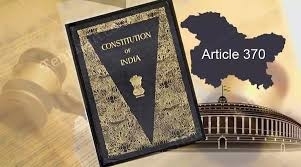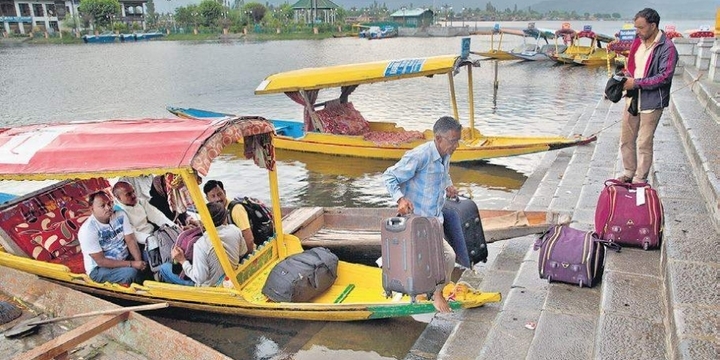The Union government has moved to scrap provisions under Article 370 of the Indian Constitution, which grants special status to the state of Jammu & Kashmir (J&K) in the Union of India.
It has decided that Jammu and Kashmir would be turned into a Union Territory with a legislature, and the Ladakh division would be made a separate Union Territory (without legislature).
Home Minister Amit Shah has announced in the Rajya Sabha that provisions of Article 370 were being scrapped.
The notification has already been signed by President Ram Nath Kovind.
What is Article 370 & 35A?
Article 370 of the Constitution grants special status to Jammu and Kashmir, while Article 35A empowers the state legislature to define the state’s “permanent residents” and their special rights and privileges.
Article 35A, which was incorporated in the Constitution by a 1954 Presidential Order, gives special rights and privileges to the citizens of Jammu and Kashmir.

How does this change the current situation in Jammu and Kashmir?
Any citizen of the country will be able to buy property in Jammu and Kashmir.
J&K will no longer have a separate flag.
J&K will no longer have dual citizenship.
J&K will no longer be a separate state but a union territory with assembly.
Ladakh is declared a separate union territory (UT).
The term of the Legislative Assembly will be 5 years instead of 6 years.
The special status of Jammu and Kashmir is scrapped
Laws like RTI and CAG will also apply here.
Now, any citizen of the country can get a job in Jammu and Kashmir.
After the removal of Article 370, Jammu and Kashmir do not get any exclusive rights.

Historic background of Article 370
With the end of the British paramountcy, the State of Jammu and Kashmir (J&K) became independent on 15th August 1947. Initially, its ruler, Maharaja Hari Singh, decided not to join India or Pakistan and thereby remain independent.
But, Kashmir was invaded by the Pakistan-backed "Azad Kashmir Army on October 20, 1947, and confiscated a part of Kashmir region which is now known as Pakistan Occupied Kashmir (POK).
In this situation, Maharaja Hari Singh, signed the "Instruments of Accession of Jammu and Kashmir to India" with then PM of India, Pt. Nehru on October 26, 1947, and under it, the state surrendered only three subjects: Defense, External Affairs and Communications to the Dominion of India.
In keeping with the promise that Nehru’s Government made with Maharaja Hari Singh when he signed the Instrument of Accession on 26th October 1947 Article 370 was inserted in the Indian Constitution in November 1952.
Salient Features of Article 370
Jammu and Kashmir is a constituent state of the Indian Union and has its place in Part I and Schedule I of the Constitution of India.
The State of J&K has its own Constitution and is administered according to that Constitution.
Parliament can make laws in relation to the state on most of the subjects enumerated in the Union List and on a good number of subjects enumerated in the Concurrent List. But, the residuary power belongs to the state legislature.
Part III (dealing with Fundamental Rights) is applicable to the state with some exceptions and conditions. The Fundamental Right to Property is still guaranteed in the state. Also, certain special rights are granted to the permanent residents of the state with regard to public employment, acquisition of immovable property, settlement and government scholarships.
Directive Principles of State Policy Fundamental Duties are not applicable to the state.
A National Emergency declared on the ground of internal disturbance will not have an effect on the state except with the concurrence of the state government.
The President has no power to declare a financial emergency in relation to the state.
The President has no power to suspend the Constitution of the state on the ground of failure to comply with the directions given by him.
The State Emergency (President’s Rule) is applicable to the state. However, this emergency can be imposed in the state on the ground of failure of the constitutional machinery under the provisions of the state Constitution and not Indian Constitution.
International treaty or agreement affecting the disposition of any part of the territory of the state can be made by the Centre only with the consent of the state legislature.
The Fifth Schedule (dealing with administration and control of scheduled areas and scheduled tribes) and the Sixth Schedule (dealing with the administration of tribal areas) do not apply to the state.
Can Article 370 can be abrogated constitutionally?
Article 370 reads that the president of India can abrogate this special provision in consultation with the Constituent Assembly of the state but with the assembly having been dissolved in 1956, now the State Legislature being its representative, it is not easy for the Union Government to do that, Supreme Court may put a barrier on it.
No comments:
Post a Comment